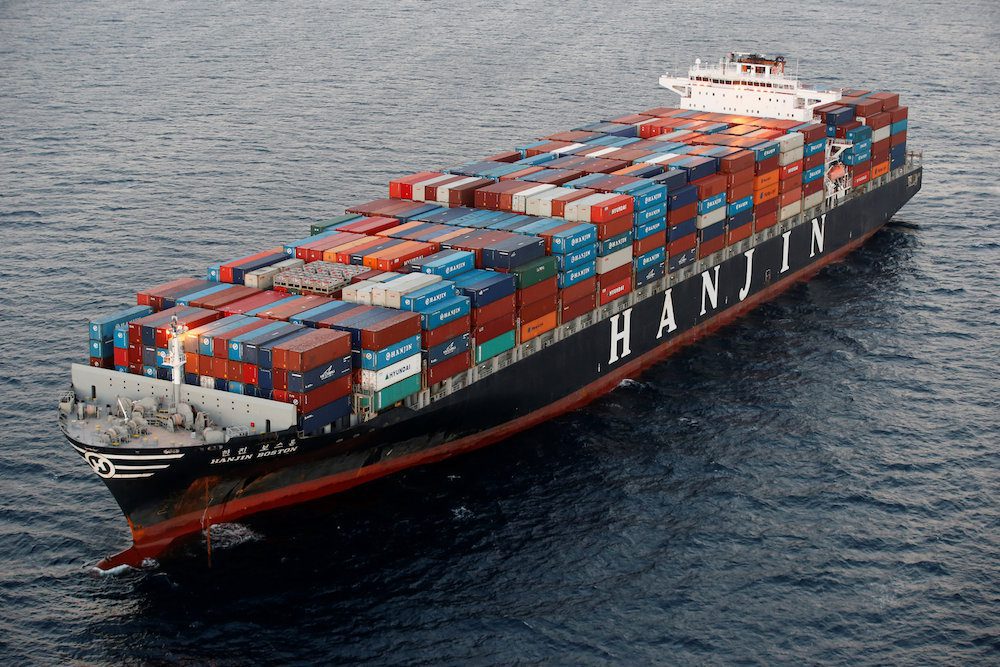A Hanjin Shipping Co ship is seen stranded outside the Port of Long Beach, California, September 8, 2016. REUTERS/Lucy Nicholson
 By Tom Hals
By Tom Hals
Sept 9 (Reuters) – A U.S. judge said on Friday he will grant Hanjin Shipping Co Ltd provisional protection from creditors in the United States, enabling some vessels to dock and unload at U.S. ports.
South Korea’s Hanjin asked U.S. Bankruptcy Judge John Sherwood to issue an order that would prevent creditors from seizing Hanjin ships or property, and allow cargo owners to make arrangements to retrieve goods stranded in warehouses. Sherwood said he would sign the order later on Friday.
Earlier, the company received authority to spend the money needed to dock at U.S. ports and begin unloading four vessels that have been stranded at sea by the company’s failure last week, a company lawyer told a U.S. court on Friday.
“We have the money,” said Ilana Volkov, an attorney for Hanjin, told a U.S. Bankruptcy Court hearing in Newark, New Jersey on Friday. “We want to call these ports and say, please accept our ships and we want to pay for the services to work the ships.”
Volkov said at least $10 million was authorized by a Korean court to begin servicing the four ships. Hanjin identified 14 U.S.-bound ships in court papers, but Volkov said she did not have information about the other vessels.
The company said that some ships may not dock at their original destinations, which could become an issue for companies like HP Inc, Samsung Electronics and Home Shopping Network, who said in court records or in court they had cargo on those ships.
The four U.S.-bound ships are the Hanjin Boston, Hanjin Greece, Hanjin Jungil and Hanjin Gdynia.
Around $14 billion of cargo has been tied up globally as ports, tugboat operators and cargo handling firms refuse to work for Hanjin, the world’s seventh-largest container carrier, which filed for receivership in a Seoul court last week.
HAVOC FOR GLOBAL TRADE
Hanjin has been struggling to arrange financing to resume normal operations. Korean Air Lines, the biggest shareholder in Hanjin, delayed on Friday a decision on a funding plan.
The collapse of Hanjin has caused havoc in global trade networks and a surge in freight rates, as more than half of Hanjin’s 141 ships have been blocked from docking at ports. Four vessels have also been seized as of Thursday, according to Hanjin Shipping.
As ships await at sea, anchored off various ports from Long Beach, California, Mexico to Panama City, problems for the financially-strapped company mount as fuel suppliers also demand payment and provisions run low on the ships.
An arrest warrant was entered against the Hanjin Montevideo, currently anchored off Long Beach, and the ship was seized. The parties pressing for arrest were World Fuel Services Inc and OceanConnet Marine PTE Ltd, and Hanjin’s attorney said the company expected to work out an arrangement to release the ship next week.
The judge asked companies along the supply chain to hammer out a protocol agreement over the weekend that would get goods moving again. Hanjin has suggested cargo owners were free to pay cargo handling fees owed by Hanjin, which Samsung Electronics called ransom payments.
Hanjin’s woes were having wider knock-on effects. Sherwood was told that port terminals were not accepting the routine return of empty Hanjin shipping containers from retailers, forcing stores to spend to store them.
Uncertainty about freight fees was leading to vast numbers of containers clogging warehouses at port terminals. As containers piled up with retailers and on docks, the available pool of chassis used to transport containers was dwindling.
Sherwood repeatedly urged the parties to “self-help” and work out the problems as best they could.
Hanjin’s collapse could also hit the bottom line at several companies as it came during the peak shipping period ahead of the year-end holiday season.
But import cargo volume at the nation’s major retail container ports should be at near-peak levels for September, according to the monthly Global Port Tracker report by the National Retail Federation and Hackett Associates.
“Hanjin should not significantly affect volume for the month since alternative arrangements to unload those containers or shift cargo elsewhere should be dealt with by the time the numbers are tallied,” NRF Vice President for Supply Chain and Customs Policy Jonathan Gold said.
“Merchandise is in limbo at the moment and retailers are working hard to make sure it ends up on store shelves in time for the holidays.”
The shipping line has filed for so-called U.S. Chapter 15 bankruptcy, which allows a company to seek recognition by U.S. courts of orders issued overseas.
(Reporting by Tom Hals in Wilmington, Delaware; Writing by Bernard Orr; Editing by Nick Zieminski)
(c) Copyright Thomson Reuters 2016.

 Join The Club
Join The Club











